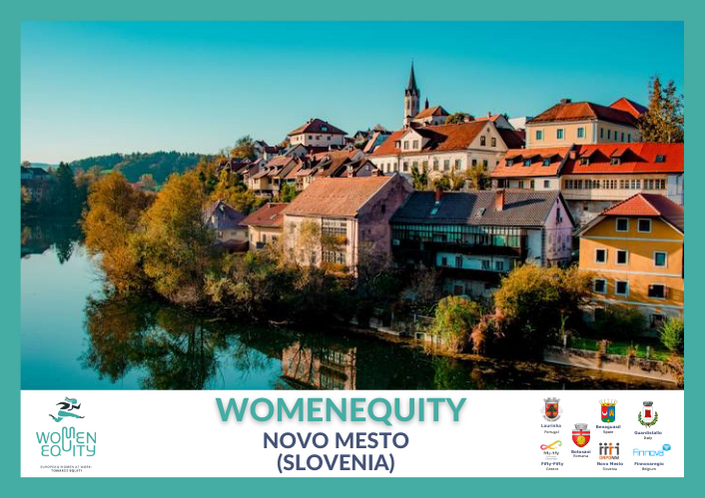• On 7 and 8 February, the Municipality of Novo Mesto, in Slovenia, will host the fourth activity of the WomenEquity project.
• The Finnova Foundation, which is part of the consortium together with 6 other entities, will organise the last of the events in Brussels.
• With a budget of €137,435, WomenEquity is a project of the Networks of Cities call of the Citizenship, Equality, Rights and Values Programme (CESR), which addresses women’s access to the labour market from a European perspective.
On Wednesday 7 and Thursday 8 February, the Slovenian municipality of Novo Mesto will host the fourth event of the European project WomenEquity, which aims to improve women’s access to the labour market from a European perspective. The event will bring together local actors from the different European countries that are part of the project consortium, with the aim of exchanging European values and cultural traditions and strengthening the links between EU territories.
The Finnova Foundation, a key partner in this project, will again play a key role by providing its essential European dimension. The Spanish-Belgian Foundation is already preparing the last event in Brussels of this project, the fruit of a public-private partnership that seeks to raise awareness, reduce barriers, and find solutions.
WomenEquity, developed in collaboration with seven European organisations from Belgium, Spain, Italy, Greece, Portugal, Romania and Slovenia, aims to actively engage individuals and organisations to promote gender equality and provide practical tools to improve the situation of women.
The Slovenian event follows those held in Benaguasil, Lourinha and Guardistallo, and is one of seven events planned during the 18 months of the project. The aim is to produce audiovisual materials reflecting the reality of women in the world of work and a good practice guide, which will compile local initiatives carried out in the world of work and serve as a communication tool for citizens. This will allow participating municipalities to replicate them or serve as an example and inspiration for others.
About WomenEquity
With a budget of €137,435EUR, the project is led by Benaguasil Town Council togehter with a consortium of six other organisations from Italy, Portugal, Greece, Romania, Slovenia and Belgium.
WomenEquity is part of the Networks of Cities call of the Citizenship, Equality, Rights and Values Programme (CERV), and seeks to address women’s access to the labour market from a European perspective, thanks to the collaboration between municipalities such as Benaguasil, Botosani, Lourinha or Guardistalo in cooperation with private entities such as Finnova or Fifty-Fifty. Through this public-private partnership, the aim is to raise awareness and seek solutions to reduce these barriers and improve their conditions. The project also aims to raise awareness and involve all citizens in this reality, as well as public and private entities, offering work tools based on equality to achieve greater inclusion of women in the labour market.
About the Finnova Foundation
Finnova is the Spanish-Belgian non-profit foundation based in Brussels and Spain, working for the promotion and development of innovation and entrepreneurship in the EU. Finnova’s experience in leading communication and dissemination activities for European projects is combined with a proven track record in business creation and entrepreneurship support programmes, such as accelerators, incubators and events, as well as its commitment to training and employability of young people.
About the Citizens, Equality, Rights and Values programme
The Citizens, Equality, Rights and Values programme funds citizens’ engagement, equality for all and the implementation of EU rights and values. The programme brings together the former Rights, Equality and Citizenship programme and the former Europe for Citizens programme. It thus promotes exchanges between people from different countries, strengthens mutual understanding and tolerance, and provides the opportunity to broaden perspectives and develop a sense of European belonging and identity through twinning and town networks. The programme follows a bottom-up approach while offering, in particular to town networks, the opportunity to focus on EU priorities.

